|
57-58 East Cliff
Dover
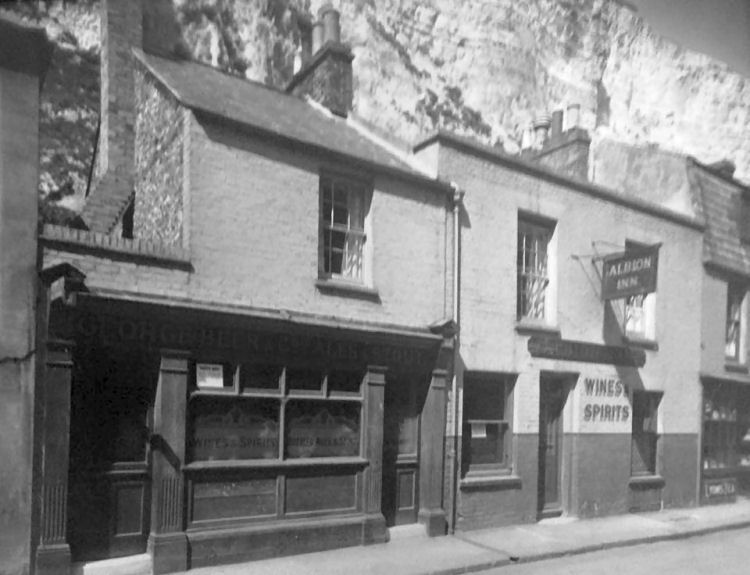 |
|
Above shows a picture of Albion taken from the John Gilham
collection circa 1920.
|
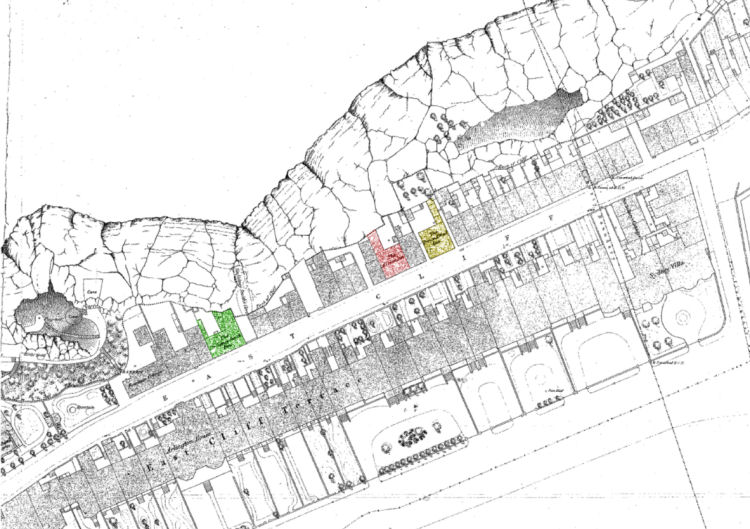
The above map shows the position of the "Prince Alfred" in yellow. Red
is the "Albion" and green is the
"Sir Sidney Smith" circa 1890.
|
|
From the Kent Messenger, 22 May 1964.
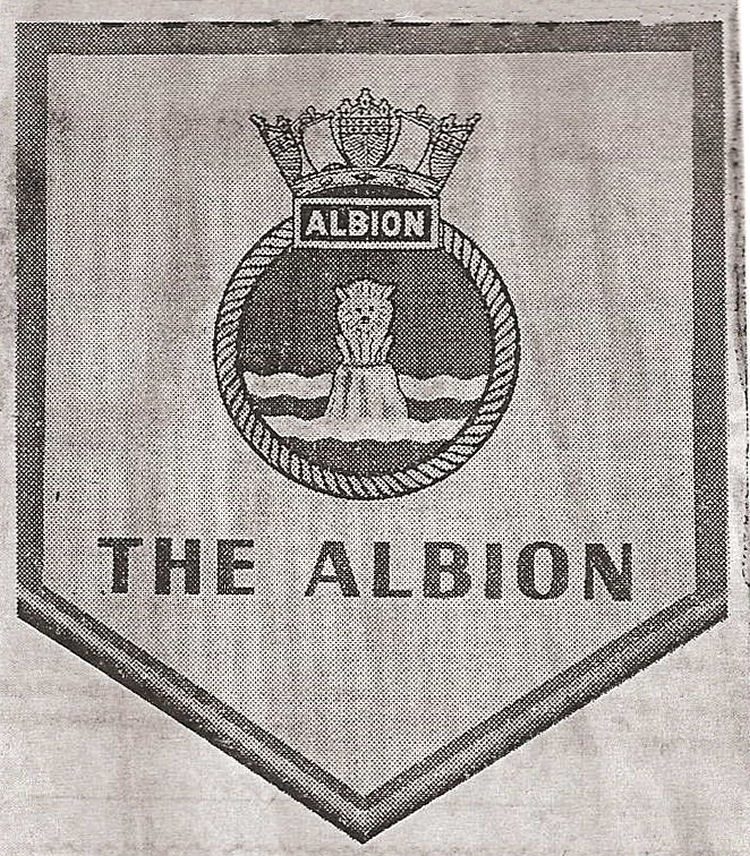
Public house has "link" with ship.
THE ALBION INN SIGN
A copy of the crest of aircraft carrier H.M.S. Albion, which was
"adopted" by Dover 10 years ago.
Dover's link with aircraft carrier H.M.S. Albion has just been
cemented - by a public house.
The ship was "adopted" by the town of Dover more than 10 years ago,
when she was newly commissioned. Since then she has been on active
service in many parts of the world.
It was, in fact, while she was in the Far East last summer that
Fremlins, the brewers, who own the Albion public house, East Cliff,
applied for permission to use the ship's crest as an inn sign.
The Commanding Officer, Capt. C.D. Madden, readily agreed, but
arrangements and negotiations with the Admiralty took nearly 12 months.
Now a copy of the crest - which depicts a lion sitting on a rock amid
waves - swings outside the inn. It is painted in blue and greys,
picked out with gold and red.
H.M.S. Albion is now in dock at Portsmouth - and a crew member, 19
year-old Keith Tidd, whose father is publican of the "Royal
Standard" in Folkestone, is going over to check that the minor
details of the sign are correct. |
|
Below a photo by Barry Smith circa 1980.
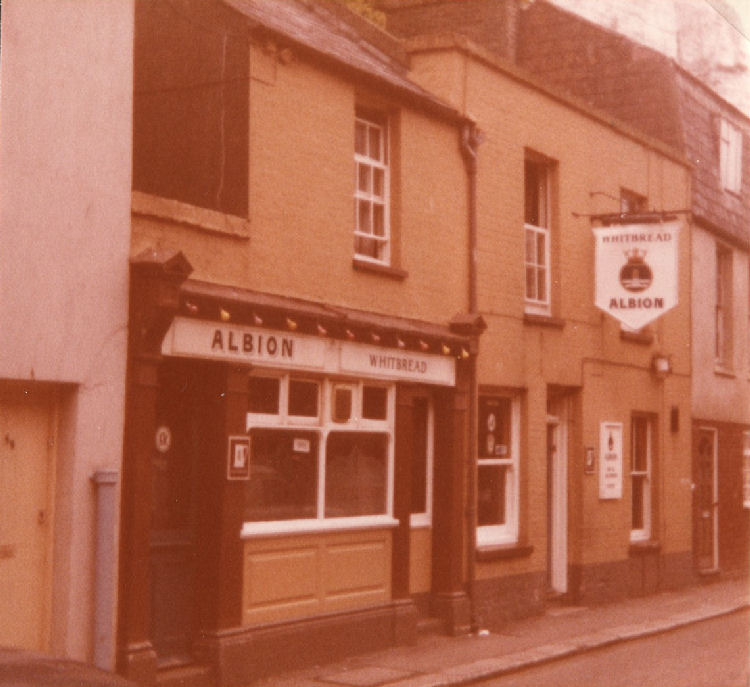 |
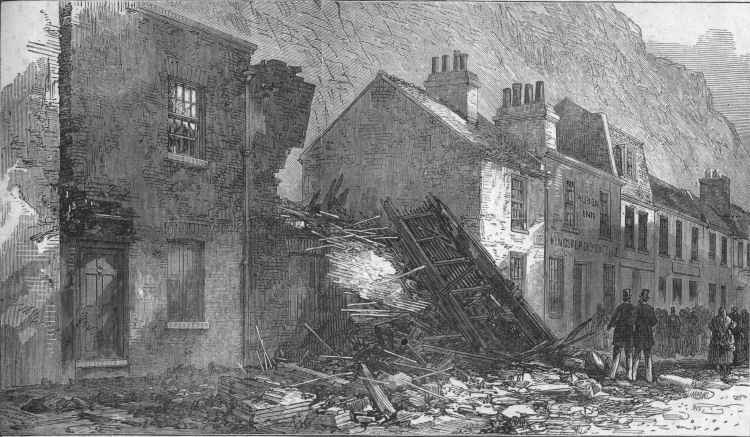 |
|
Houses destroyed at East Cliff by The Albion. Illustrated by Gordon Nevis
7th December 1872. By kind permission of over Library ILL/697. |
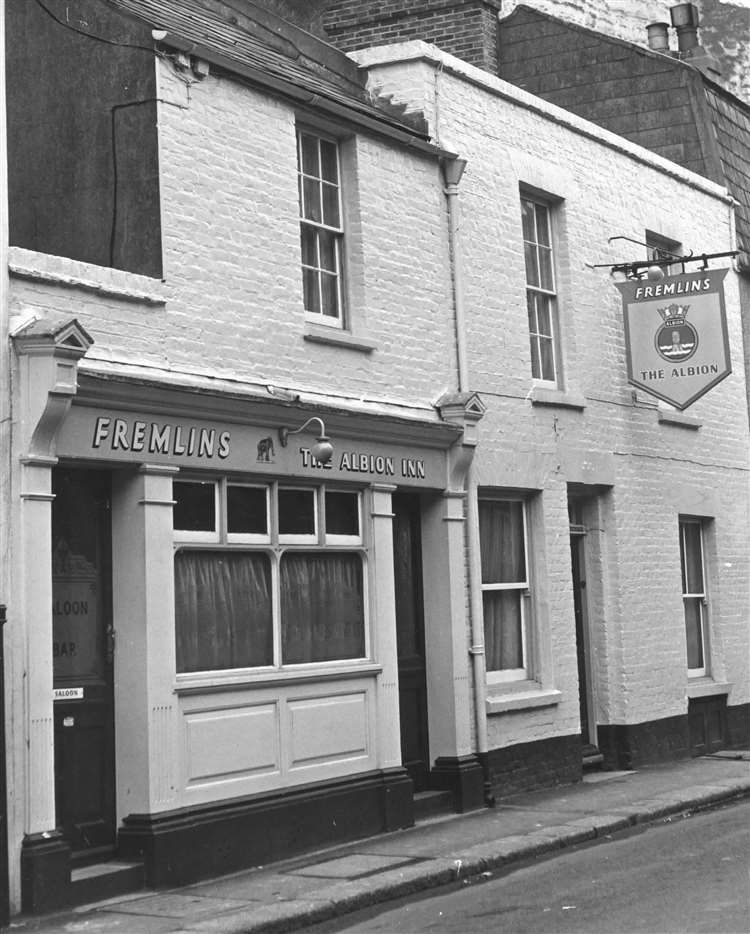
Above photo 1968. |
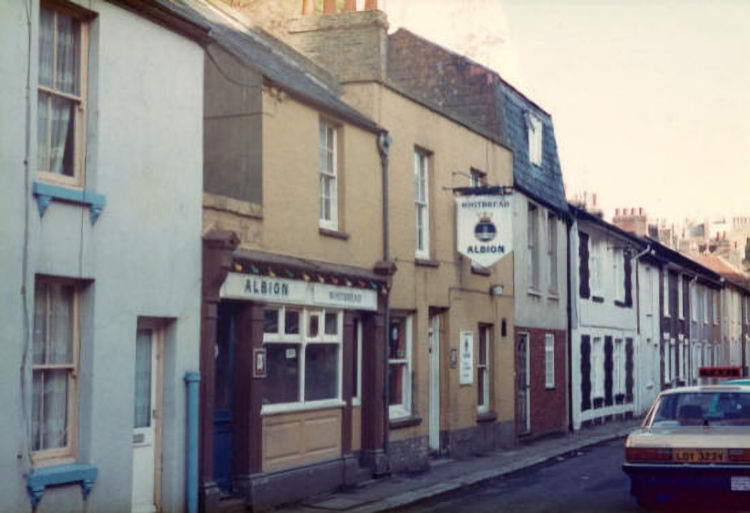
Above photo, 1983. |
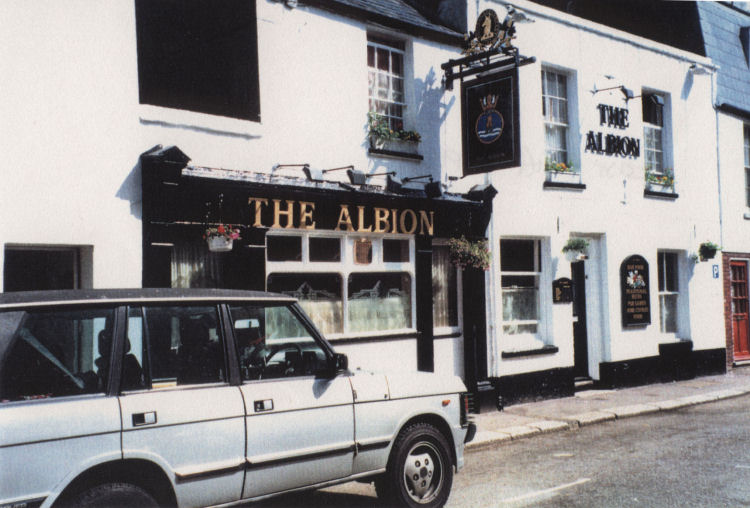 |
I have just managed to predate this public house from Barry's original
research. To a time just after it was built according to the following
article found in the Dover Telegraph, dated 15 August 1840.
The census transcript for 1841 give the name of the house as "East Cliff
House," with Joseph Mays (age 60) living with his wife Mary (age 65.)
A different brewer supplied from 1859 when it sold for £355. Five a.m.
opening was permitted from 1898, which meant that it joined seventeen other
houses enjoying that privilege. Another eighteen were opening at three
thirty a.m. With respect to this house that concession was withdrawn the
following year. Its close proximity to the sea and cliffs naturally
attracted the attention the attention of the smuggling fraternity and two
flint cottages in the rear have been used as a cellar and decorated as a
smugglers cave. Some trouble in the past from cliff falls necessitating the
closure in October 1967 but reopening in June 1968, the cliff meanwhile
being trimmed to prevent a reoccurrence. One of Gardener’s which passed to
Whitbread.
|
From the Dover Telegraph and Cinque Ports General
Advertiser, Saturday 15 August, 1840.
EAST CLIFFE, DOVER
Sale of valuable building ground and premises.
MR. ROBINSON
Respectfully announces that he has received the transaction to
SELL BY AUCTION,
On Monday, the 17th day of August inst. at the "Shakespeare Hotel,"
in Dover, at two for three o'clock in the afternoon precisely, the undermentioned valuable property.
LOT 1. All that substantial and newly erected DWELLING HOUSE at East
Cliffe, in the occupation of of Mr. Joseph Mays, with Skittle Ground and
Outbuildings. These Premises are in good repair, and at a trifling
outlay might be converted into an excellent Lodging-House, with a view
of the Sea, Dover Harbour, &c. (having a right of way to the adjoining
Passage,) are now used as a retail Beer-House, known by the sign of the
"Albion," where an excellent Trade is carried on.
LOT 2. All that BUILDING recently erected on Round Down, near
Shakespeare Cliff, and used as a Beer-House, where an extensive Business
has been, and now is, carried on with the Persons employed on the S. E.
Railway. ("Shakespeare
Head.")
The above Lots present a sure investment, either for a Brewer or an
industrious Man with small Capital wanting Business.
For Particulars and to treat for the Purchase, apply to the
Auctioneer, Phoenix Fire Office, 18, Bench Street, Dover.
I believe the beer-house mentioned in lot 2 is the "Shakespeare
Head."
|
|
From the Kentish Gazette, 10 February 1846.
DOVER.
On Monday, the 2nd instant, an inquest was held at the "Albion Inn," on
the body of John Risby, before M. Kennett, Esq, deputy coroner. It
appeared that the deceased was a labourer, in the employ of Sir. Bray,
the contractor for the harbour works, and fell from a plank whilst
wheeling a loaded barrow drawn by a horse.
Verdict, "Accidental death."
(This could, of course refer to the "Albion"
at Hawsbury Street. Paul Skelton.)
|
A different brewer supplied from 1859 when it sold for £355. Five a.m.
opening was permitted from 1898, which meant that it joined seventeen other
pubs enjoying that dubious privilege. Another eighteen were opening at three
thirty a.m. With respect to this house that concession was withdrawn the
following year. Its close proximity to the sea and cliffs naturally
attracted the attention of the smuggling fraternity and in our time, two
flint cottages in the rear have been used as a cellar and decorated as a
smugglers cave. This only held a beer licence till 1950 when it was granted
a "full" license to sell beer and spirits. Some trouble in the past from cliff falls, necessitating the
closure in October 1967 but reopening in June 1968, the cliff meanwhile
being trimmed to prevent a reoccurrence. In keeping with its contemporaries,
a great deal by way of alteration and modernisation achieved over the years,
especially since 1975. One of Gardner's which passed to Whitbread. Was
serving Fremlins in 1974.

|
From the Dover Express and East Kent News, Friday,
10 April, 1868.
INFRINGEMENT OF LICENSE.
George William Turner, the landlord of the "Albion" public-house,
East Cliff, was charged with infringing his license by having his house
open shortly before twelve o'clock on Sunday last.
Police-sergeant Stevens said he visited the house at the time named,
and found a man sitting at the bar with a glass of beer before him, and
another in a room, with a pint of beer. The men were both residents of
Dover.
The defendant's only excuse was that the men represented that they
had been for a long walk, and begged very hard that he would serve them
with some refreshment.
It appearing that this was the defendant's first appearance before
the Bench, the Magistrates ordered him to pay the costs only (7s.) which
he did, thanking the Bench for their lenience.
|
|
From the Kentish Chronicle, 26 April, 1862.
THE ARTILLERY ACCIDENT AT DOVER.
The inquest upon the body of the unfortunate artilleryman, Andrew
M'Dowell, who was killed by the accident at the Drop Battery, on Monday,
was opened on Tuesday afternoon, at the “Albion Inn,” Dover, before the
borough coroner, W. H. Payn, Esq. The body presented a shocking
spectacle, one of the arms as well as one of the thighs of the deceased
being completely blown away.
Lieutenant-Colonel Guy Rotton, Royal Artillery, said; “I was on duty in
the Drop Buttery on Monday morning and in command while the guns were
being practised. The general order was that on a signal being given from
the Castle the guns at the Drop Battery should fire, but not till I had
given the order. I was turning to do so, the men having fallen out
around the battery, when I saw the man who was doing the duty on No. 7
(really No. 5) in the act of firing. This was after the signal had been
given from the Castle, but before I had given the order.
John Brewin, acting bombardier, said be was No. 1 at the gun in
question. Declined was one of the men employed upon the adjoining gun.
Witness was standing on the right side of the gun near to the muzzle,
and was talking to the deceased at the time of the discharge. Deceased
was sitting on the parapet of the battery, a little in advance of me,
and on the same side of the gun. I did not know the gun was loaded. It
should not have been loaded without orders, and no orders were given. On
the discharge of the gun, I saw deceased blown over the parapet with two
other men. I immediately went to the breech of the gun, and received
orders from Col. Rotton to confine the man who had fired the gun.
Thomas M’Carthy, the man who fired the piece, was also examined, having
been first cautioned, but wan not sworn. He said he heard some one shout
“Fire!” shortly after the signal had been given from the Castle, and
thinking the word came from a non-commissioned officer, he pulled the
friction tube.
The jury returned the following verdict:— “That the deceased was
accidentally killed by the premature firing of a gun, and the jury are
of opinion that measures should be taken in future to prevent guns being
loaded and fired without orders.”
The two other men are not hurt so badly as was at first feared, and are
now progressing satisfactorily.
|
|
From the Southeastern Gazette, 5 June 1866.
THE BANKRUPTCY ACT, 1861.
IN THE COUNTY COURT OF KENT HOLDEN AT DOVER.
IN the matter of WILLIAM BURWILL, late of East Cliff, Dover, late
victualler, and late a prisoner for debt in Maidstone Gaol, adjudged
Bankrupt (in forma, pauperis) by the Registrar of the County Court of
Kent, holden at Maidstone, attending the said gaol on the 19th day of
March, 1866.
An Order of Discharge will be delivered to the bankrupt after the
expiration of thirty days from this date, unless an appeal be duly
entered against the judgment of the Court, and notice thereof be given
to the Court.
Dated this 9th day of May, 1866.
THOS. BOWLING, High Bailiff.
|
|
From the Dover Express and East Kent Intelligencer,
13 February, 1874. Price 1d.
DEATH BY SCALDING AT DOVER
An inquest was held before Mr. W. H. Payn, coroner, at the "Albion
Inn," East-cliff, to enquire into the cause of death of Edward William
Claw, a child of one year and nine months old, who died after being
severely scalded by pulling a teapot full of hot water upon himself. Mr.
Wright was the foreman of the Jury.
Jane Claw, the mother of the child said: The boy was one year and
nine months old. He could walk. On Friday afternoon I had occasion to go
into a neighbouring shop to fetch an egg for the child. I left the child
alone in the room. There was a fire without any guard. There was a
kettle full of hot water and a teapot on the hob. I had not been absent
more than two minutes, and when I came back the child was standing
before the fire and the teapot was pulled on the floor and the water was
all run out of it. The child was not crying, but I saw he was wet and I
took his things off. He then cried and the skin came off his chest. The
child's mouth was also scalded, and his tongue afterwards turned quite
black. The child died on Monday afternoon at 3 o'clock. I believe the
child died from the effects of the scalding. Once before I caught the
child trying to drink out of the teapot. I did not get a doctor until
Monday morning. Until then I thought the child would get better. The
child died before any medicine came. I had dressed the wounds with oil.
Mr. Arthur Long, surgeon, Union Medical Officer, said: The last
witness asked me to attend the child, and i saw the child about 12
o'clock, and found it suffering from an extensive scald on the chest and
side, and the mouth was scalded inside. The child was almost dying then.
It lived about three hours after then, and died from the effects of the
scald. Death was hastened a good deal by the severity of the weather.
The child was properly attended to.
By a Juror: I do not think the child would have been saved if i had
seen it before. The people used the dressing very well, and did all that
could be done.
The jury returned a verdict of "Accidental death by scalding."
|
|
From the Dover Express and East Kent News, Friday, 12 February, 1875. Price 1d.
A VIOLENT SEAMAN
Benjamin Burvill was charged with being drunk and disorderly, assaulting
Police-constable Nash and Bath, and tearing the uniform of
Police-constable Bath.
Police-constable Bath said: Last night at 10.30 I was on duty at East
Cliffe. I saw the defendant and another man fighting outside the “Albion
Inn.” In was asked by defendant's wife to part them. I did so, and took
defendant to his house. He was drunk and violent. The other man made
away directly. Burvill said he would go back and fight. I told him he
should not. I would not allow such conduct. He said, “let go of me or I
will knock your head off, and tear your clothes into ribbands.” He
struck me in the face and tore my coat. I then sent for further
assistance. Constable Nash and Bowles came and took him to the
Police-station. The damage to my coat is 7s. 6d. I saw him strike Nash
in the face.
Police-constable Nash said he was on duty at East Cliffe of the previous
night. The prisoner was then in a public-house. Bath told him that
prisoner had broken away. They waited till he came out, and when he did
come out he ran towards the jetty. Bath and witness took him into
custody and prisoner struck witness in the face.
The prisoner said he had nothing to say. He was drunk and disorderly.
Mr. Mowll: It appears your evening's entertainment will not bear this
morning's reflection. There is a sad catalogue against you, I am sorry
to say. You are a quieter man when sober, but very troublesome when
drunk.
The defendant was fined including costs, £1 15s. 6d. for the assault on
the Police, and for damage to the coat. The money was paid.
|
|
The Dover Express, Friday Evening, 13 October, 1876. DANGEROUS WOUNDING.
Thomas Artlett was indicted that he did unlawfully wound William Burvill
at Dover on the 17th June. Owing to the parties being at sea the case
had been adjourned.
Mr. Croft, instructed by Mr. T. Fox, prosecuted; and Mr. Lewis Glyn was
instructed by Mr. Worsfold Mowll for the defence.
William Burvill, the prosecutor, said:- I am a waterman, and live at
Dover. On June 7th, about 10 p.m., I had just come ashore with a pilot.
I went to the "Albion Inn" with two men named Grant and Claw. Defendant
and his non Stephen came in, and soon after Thomas Artlett, defendant’s
brother, came in with his wife. After some time Steven and Thomas
Artlett left, wishing me good night, with his wife. Stephen had his
evening suit on. Soon after defendant came in and said, “You have said
my boat drowned four people. I will make you prove your words.” I denied
I had said anything of the kind. He then said “There will be a man come
down from London to give you a good hiding.” I said I did not care for a
man from London, nor anyone of his sons. At this moment defendant’s son
Stephen rushed in with his coat off and his sleeves tucked up, and
struck me on the shoulder. I was going to hit him back, when the old
gentleman (defendant) hit me over the top of the head with the bottle
and jobbed the broken piece in my face, so I did not have much chance.
He took the bottle by the nose and struck me on the head, and jobbed me
in the face with the nose remaining in his hand. I bled very much from
my head and face, and said to defendant, "You have cut me all to
pieces.” He said, “I have not; you’re a liar.” I don’t think defendant
was the worse for drink. I was not, as I had only drunk two pints. I
went home, and my wife tried to stop the bleeding. She could not, and I
went straight to the hospital, and remained there a week. I returned
home, but the next day, as I was reaching for some cocoa, the bleeding
broke out again. I was taken to the Hospital, and remained there five
weeks. I did not hit Stephen Artlett, though he would have got hit you
may depend but for the bottle.
Cross-examined:- I am naturally quiet, as quiet as the rest.
Cross-examination:- I did not tell Stephen that his father had a boat
which had drowned four people.
Elizabeth Ball, landlady of the "Albion Inn," East-cliff, said Burvill
and the others were quarrelling together before Stephen Artlett went
out. Just after he returned she heard a crash of glass, and went to
separate him from Burvill, who was bleeding very much. She did not see
who began the fight. As Burvill was going out of the door defendant's
wife took hold of his coat and asked what was the matter. He said
something, drew himself away, and she fall down. Then there was a
general row.
Mr. Ashby Osborn, one of the hon. surgeons of Dover Hospital, said
Defendant was admitted to the Hospital in June last. I saw him on June
19th. He had a small cut on the top of his head and a wound in his left
cheek both of which had been dressed on his admission. The hemorrhage
had been stopped with great difficulty with pins, and I directed the
dressings not to be removed for some time. As there was no bleeding when
the dressings were removed, I allowed him to go home, but the day after
he left the hemorrhage recurred. He came back to the Hospital and the
bleeding waw stopped with great difficulty. The wound was dangerous on
account of the hemorrhage and the liability to erysipelas. A wound of
this kind is much more dangerous than a clean cut; it was a jagged
wound. In this case a small artery was partly severed, and I had to
divide the tissues down the bone to allow the arteries to retract.
Mr. Glyn called the following witnesses:— Stephen Artlett:- I am a
fireman. On the night in question I was at the "Albion." Defendant was
there, and said “I never had boats on the beach to drown people,” and in
answer to something I said he called me a fool. My wife cameo in, and I
went home with her. At about half-past ten I went to "Albion" again. My
wife was there before me, as she had heard Burvill and my father were
quarreling. I found Burvill in the act of striking my wife, and abusing
her. He struck out over my wife’s head, and hit me on the eye, blacking
it and making my nose bleed. At the same time he caught me by the throat
with his other hand, and I fell down unconscious. I did not come to until
my wife had placed me in a chair behind the bar door. I then saw my
mother sitting on the floor in a fainting condition. My throat was sore
for several days after.
Martha Artlett, wife of the last witness, said she went to the "Albion"
the second time to protect her father-in-law from Burvill, who commenced
to swear at her as soon as she arrived. He raised his hand to strike her
as her husband came in, and in the row that followed she received two
severe blows on the face. When her husband came in Burvill struck at him
over her head. Defendant pulled her away, and she then saw Burvill with
one hand at her husband's throat and punching him with the other hand.
Something flashed across witness’s eyes for a moment, and she then saw
her husband on the ground and assisted him to a chair. Her husband took
out a summons the following Monday.
Artlett was found guilty, but recommended to mercy, and the recorder
sentenced him to three months’ imprisonment.
|
|
From the Dover Express and East Kent Intelligencer,
21 September, 1877. Price 1d.
ALLEGED BREACH OF LICENSING ACT
Elizabeth Ball, landlady of the "Albion Inn," East Cliff, was
summoned for selling intoxicating liquors during prohibited hours, on
the 16th September, to persons not being bonâ fide
travellers.
Mr. Worsfold Mowll defended.
Police-constable Baker said about a quarter to eleven last Sunday he
was on duty at the back of East Cliff, and he saw a man leaving the
"Albion" public-house. He then went to the house, and heard someone
talking inside. He pushed the door open, it not being fastened, and
found a lady and gentleman in the bar, with some beer in front of them.
The lady drank the beer. He asked the landlady what it meant, and she
said that the people had been out in the country about six miles, and
she thought there was no harm in drawing for them. He asked the
gentleman where he slept, and he told him at Canterbury. He afterwards
ascertained that he slept at Athol Terrace. The gentleman said he was a
visitor from London, and thought the closing time was at eleven. He told
the landlady that he should report the matter.
Mr. Mowll said, although it was an unusual thing, he should like to
make an observation here, as he had been taken entirely by surprise by
the evidence which the constable had given. He had been instructed by
the gentleman who was on the premises at the time in question, who was a
barrister, and he had sent him a written statement, but nothing had been
stated about them having anything to drink. According to his
instructions, it appeared that his client and his wife had been out in
the country, and on their return called in to have a chat with Mrs.
Ball, but did not have anything to drink. He (Mr. Mowll) should like to
sift the matter entirely, and, therefore, asked for an adjournment till
Monday. He should reserve his cross-examination in order that all
fairness might be done to the constable.
The case was adjourned accordingly.
|
|
From the Dover Express and East Kent News, Friday, 28 September, 1877. Price 1d.
BREACH OF THE LICENSING ACT
Elizabeth Ball, landlady of the “Albion Inn,” Eastcliff, was summoned
for selling intoxicating liquors during prohibited hours, on the 16th
September, to persons not being bona fied travellers.
Mr. Worsfold Mowll defended.
The case had been adjourned from Friday last.
The evidence of Police-constable Baker, taken on Friday, was read, and
the Constable cross-examined on that evidence as follows: I saw a man
leave the house previous to my going in. I do not know his name. The
gentleman who said he had been six miles in the country came out and
spoke to me, and told me he was a visitor staying at Athol terrace. He
did not mention anything about the man who had left the house
previously. I am certain that the woman drank the beer.
Mr. Mowll said he took a somewhat unusual course on Friday in asking for
an adjournment, but he did so because he did not wish to attack the
truthfulness of the Constable unless he was perfectly clear that his
instructions would warrant him in doing so. Since last Friday he had an
opportunity of thoroughly going into the case and ascertaining the
actual facts. He should now advise the defendant to plead guilty to the
charge under circumstances which he would shortly explain, and if it
were necessary to put the people concerned on their oaths he should be
in a position to do so. The facts of the case were that on the Sunday in
question Mrs. Prater, a neighbour, had been confined of her fourteenth
child, and in the evening her husband asked her if she did not require
some sustenance. The wife said she should be very thankful if he could
obtain her some brandy. It was then just before ten or just after, and
the husband went to obtain the brandy. Mr. Prater was not in Court this
day, but their Worships would understand that with fourteen children it
was necessary for him to attend to his work. When he went to the house
the gentleman, Mr. Scott, a barraster, staying at Athol Terrace, and
Mrs. Scott were there. They had gone to the house before 10 o'clock to
order some whiskey. During their stay in Dover they had become
interested in Mrs. Ball, who had had the misfortune to lose her husband
and be left with four or five children. They went in before ten o'clock,
and sat there talking when Prater came in. the whole party got extremely
sympathetic and the conversation was prolonged over the time for
closing. Mr. Scott thought the closing time was the same as on week
days, eleven o'clock, or he would not have remained after ten. Mrs.
Ball, feeling concerned for Prater in his condition, supplied him with
the brandy, and also gave him a glass of beer, which he drank and left
the house. She took no money, although no doubt a technical offence was
committed, but he was sure the Bench would not have visited her with
punishment had she simply supplied the brandy to Prater. Just then the
Constable came in. the appearance of a Constable on the scene generally
drove a man, much more a woman, to her wits end, and Mrs. Ball told
baker some ridiculous story about the lady and gentleman having slept
out of town. However, the gentleman seeing the impropriety of that tells
the Constable the real facts of the case. A bottle of whiskey had been
purchased, and Mrs. Ball gave the lady some whiskey from the tap for the
purpose of making a selection. These were fully the facts of the case,
and he would ask their Worships merely to inflict a small fine as
meeting the justice of it. There had been no intention on the
defendant's part to break the law.
The Superintendent said there had been no charge against the house
before.
The Bench tool a lenient view of the case, and fined the defendant 20s.
and 9s. 6d. costs, which was paid.
|
|
From the Dover Express and East Kent News, Friday 6 September, 1878
DOVER ANNUAL LICENSING SESSIONS
The annual sitting of the Dover Magistrates Licensing Committee took
place on Monday at Dover, for the purpose of renewing public-house
licenses, and hearing applications for new ones. The Licensing Committee
consists of E. F. Astley, S. Finnis, R. Dickeson, T. E. Black, R. Rees,
W. R. Mowll, and C. Stein, Esqrs. They were all present except Mr.
Dickeson, who is in Cumberland.
THE ALBION CAUTIONED
The tenant had been convicted for keeping the house open for the sale of
beer on the 16th Sept. last year, during prohibited hours.
The Bench cautioned the applicant, and granted the licence.
|
|
From the Dover Express and East Kent News, Friday 25 August, 1893. 1d.
DOVER BREWSTER SESSIONS
Mrs. Tapsel, of the “Albion,” East Cliff, was called up, she having been
fined £5 on the 13th of December last for having her house open on
Sunday evening, and she was cautioned not to let it occur again.
|
|
From the Dover Express and East Kent News, Friday, 24 April, 1896.
ANOTHER JUMP OVER THE CLIFF
On Sunday the mangled remains of a man were found at the foot of the
cliff just in front of the Convict Prison, the exact spot where the
previous two fatalities occurred within the last four weeks. The body
was identified as that of Joseph Crepin, who, less than nine months ago,
made an unsuccessful attempt to end his life by poisoning.
The inquest was held at the “Hotel de Paris” by the Borough Coroner, Sydenham Payn, Esq., on Monday afternoon, Mr. J. Parton being chosen
foreman of the Jury. The following is the evidence:-
George Crepin, a fisherman, living in Dover, said: The body at the
mortuary is that of my brother, Joseph Crepin. He was an army pensioner
from the 60th Rifles. He was 42 years of age. He has been employed at
Messrs. Metcalf and Mayes as a porter, but has left their employ. I last
saw him a fortnight ago. Some time ago he attempted to destroy himself.
I have been of opinion that for some time past his mind has been
unhinged. One of my brothers told me that the deceased was dismissed
from his situation.
James Tapsell, assistant at the “Albion,” East Cliff, said: Last
Saturday afternoon the deceased came into the house about half-past
four, and had some whiskey. He was quite sober, but unusually quiet.
Miss Jessie Ealden, 7, Church Place, said that the deceased had been
lodging at their house. He was last at the house on Saturday at 12.40.
William Cole, 41, Tower Hamlets Street, employed at the Steam Laundry
said that on Sunday he was on the rocks at East Cliff with another lad
named Walter Rayner. On returning, they, at the place where the other
man jumped over, found the deceased.
Dr. W. J. D. Best said that he had made a detailed examination. There
was a fracture of the base of the skull, and several pieces of chalk in
it. His thigh was smashed, and the flesh of the body on the right side
was severely lacerated. Death must have occurred at least 12 hours.
Death was instantaneous. Last August he had attended the deceased he
having taken oxalic acid. He was brought before the Magistrates, and
after being remanded for a week was allowed to go.
The Jury returned a verdict of “Suicide whilst suffering from temporary
insanity.”
|
|
Dover Express 5th July 1918.
Dover Tribunal 3rd July 1918.
The Dover Tribunal met on Wednesday afternoon at the Town Hall. Mr.
Robson was in the chair and there were also present Messrs. Prescott and
beeby.
Mr. R. Mowll appeared for Mr. J. Tapsell, aged 46, Grade 11 of the
"Albion Inn,! East Cliff.
It was stated that the house was a very busy one at dinner times owing
to the dockyard. Applicant was not suited to strenuous work and claimed
exemption on medical grounds and produced a medical certificate.
Major Sangster said that the dockyard ought to look after its own men
and there was also the point that there as another public house in the
neighbourhood.
in reply to the Chairman the applicant said that he only worked at the
house which he open four and a half hours a day.
Mr. Mowll said that there were three acres at Alkham which he
cultivated.
Three months exemption, final, was granted.
|
|
From the Dover Express and East Kent News, 6 September, 1918
"ALBION" SELF-HELP CLUB PRESENTATION.
At the weekly meeting at the "Albion" Self-Help Club held at the
"Albion" Inn, on Monday evening, a token of esteem was presented to the
local host and hostess Mr. and Mrs. Tapsell, who are leaving the above
Inn. The Chairman, Mr. W. J. Lyon, spoke of the great respect and esteem
in which they were held by all members and friends, and said it gave him
great pleasure to present the clock now standing on the table. In
handing it to Host Tapsell, he wished him and his wife long life and
happiness. Mr. and Mrs. Tapsell suitably replied Earlier in the evening.
Miss A. Tapsell was presented with a vanity bag. The clock which was
rosewood and ormula, was supplied by Messrs. Hart and Co., and bore the
following inscription:- "Albion" Self-Help Club. Presented to Mr. and
Mrs. J. Tapsell by members of the above and friends, as a token of
esteem and respect September 2nd, 1918."
Mr. Tapsell had been called upon to take work of national importance
to Mr. W. H. Saunders, who had held the licence of the "Wheatsheaf"
since December 6th, 1912.
|
|
From the Dover Express and East Kent Intelligencer,
13 May, 1927. Price 1½d.
LICENCE TRANSFER
At the Dover Police Court on Monday, the licence of the "Albion Inn,"
East Cliff was transferred from Mr. Alexander Stevens to Mr. Ernest
Miles of Gordon Road, Strood. Mr. Miles 14 years ago was licensee of the
"George and Dragon,"
Temple Ewell.
|
|
Dover Express 18th January 1946.
Town, Port & Garrison.
Mr. F. V. Fenner, to whom the licence of the “Albion” Inn, East Cliff,
was transferred on Friday, has had a long acquaintance with the town. He
first came to Dover in the surveying ship, HMS Triton in 1913, the
during the war 1914-18 was often here. Since November 1943 Mr. Fenner
has been in Dover, attached to the Officers’ Messd HMS Lynx, as CPO
steward. Previous to being recalled to the RN he held the tenancy of the
"Star Inn," Faversham, and was Chairman of the Licensed Victuallers’
Association there.
|
|
I do have a little confusion over the Tapsell licensees.
Although my notes do say that the licensee, Eliza Souter was there
from 1877 to 1893. The year 1893 seems to overlap with the 1892 for Mrs.
Eliza Tapsell.
I was wondering whether Souter was Eliza's maiden name.
It seems strange that there were two Eliza's one after the other, and
also, previous to that, there was an Elizabeth Ball mentioned at the
house at the same time, who apparently moved to the "Duke
of York," Snargate Street, in 1884. Either strange or my notes have
an error.
From an email received 12 February 2011
Probate records show William Henry Tapsell died 13 September 1885 at
Albion and left £50 to Eliza Tapsell which was 7 years before it changed
to the 1892 Tapsell so from what you're saying it's possible that Eliza
Souter and Tapsell are one and the same... interestingly when she died 7
October 1907 she left £2014! Which I would assume was quite a sum in
those days...so the Albion certainly paid!
James Tapsell, who took over after his mothers death, died with his
wife in a bomb where they lived in Dour Street, on 2nd October 1941.
Richard Ward |
|
From the Dover Express, 30 October, 1970
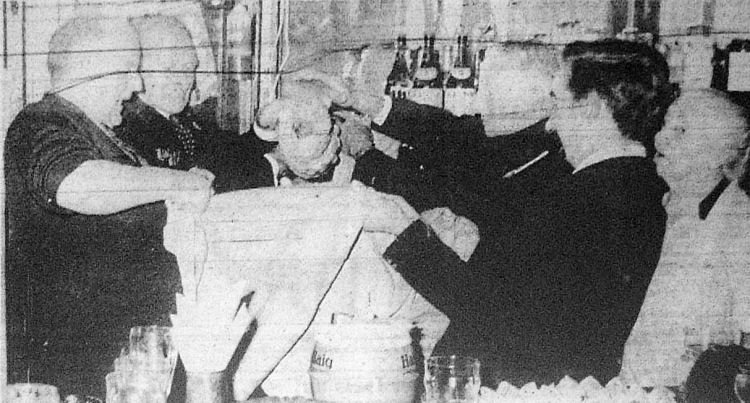
CRASH goes the second pile of pennies at the "Albion" public house at
east Cliff on Friday when £58 1s. was handed over to the National
Lifeboat Institution. Left to right demolishing the plies of pennies and
catching them in a blanket are landlord Reg Rowlen, former lifeboatman
and artist Alf Whiting, veteran lifeboatman 80-year-old Fred Philpott,
lifeboatman Tony Hawkins and Mrs. Ellen Philpott,
|
|
From the Dover Mercury 2 April 1998.
Publican may lose licence after objection to renewal.
A pub landlady who admitted breaching a court undertaking and a
management agreement will lose her licence if an appeal fails.
Police objected to the renewal of Angela Ryan's licence for the "Albion"
public house at East Cliff, Dover, at a hearing on Thursday, claiming she
was not a fit and proper person to hold a licence and could not exercise
proper control.
The justices refused to renew the licence, which expires on Saturday, but
agreed to extend it pending the appeal.
Miss Ryan took over the licence in 1994 when the former licensee Michael
Ryan was jailed for nine months for a £97,000 fraud.
Detective Chief insp Alan Scott, who interviewed Miss Ryan at the time,
said he was concerned Miss Ryan would still be involved in running the
premises.
"Miss Ryan has no experience of running a pub, had not attended a
training course and did not intend to do so," he said. Miss Ryan told me she
and Mr. Ryan were not blood relatives but were having a physical
relationship.
DCI Scott said he was surprised when, at the transfer hearing in 1994,
Miss Ryan said they had the same father. "She said under oath that the
relationship with Mr. Ryan was finished and she had no intention of ever
seeing him again."
Other police officers gave evidence that when they attended the pub in
August 1995, September and December 1997, Mr. Ryan was there, but Miss Ryan
was not. She was shopping or visiting her mother who was ill.
Sunday Telegraph journalist Jo Knowlsey, who wrote a two page feature on
bootlegging in Dover last August, said on one of her visits to the pub the
place was "heaving," mainly with men from the north of England.
"Customers were dashing in and out with holdalls and some were asking if
anyone wanted to buy fags or booze. They said they were smugglers from
Liverpool. "She said nearby residents claimed their lives had been made hell
by noise, swearing and vans being loaded up in the early hours.
During a joint operation involving Customs and police in December
1997, the pub was raided and most of the men were found to have at least
£400 cash on them. One had £1,000 in a waist bag.
Miss Ryan denied giving any undertaking to the court concerning Mr. Ryan.
"He has lived at the pub for the last four years since coming out of
prison," she said. "Nobody told me to get him out."
She was aware people tried to sell duty free goods in the pub but she
barred them. When she was away from the pub she delegated her duties to Mr.
Ryan, but he denied he controlled her.
Licensing sergeant Pat Geary: "Every time you have left these premises
you have breached the agreement and the undertaking you gave Miss Ryan:
"Yes."
|
1998 saw the pub close for a short while and when it again opened in April 1999
the name had miraculously changed to the "First
and Last." However, there used to be a "First and Last" just two doors away,
previously the "Prince Alfred" that closed in
about 1976.
LICENSEE LIST
MAYS Joseph 1840-41+ (age 60 in 1841 ) )
 LEWINGTON Thomas 1847-55+ LEWINGTON Thomas 1847-55+
 
GOODMAN George 1858

CASHMAN John 1859
BURWILL William 1862-66

TURNER George William 1868
STONE George 1874

BALL Patrick 1875
BALL Elizabeth Mrs 1877-Sept/84
 (age 40 in 1881
(age 40 in 1881 ) )
 
SOUTER Eliza 1877-Feb/93


 TAPSELL Eliza Mrs 1890-1907 dec'd (age 48 in 1891
TAPSELL Eliza Mrs 1890-1907 dec'd (age 48 in 1891 ) )
      
TAPSELL James 1907-Sept/18 (age 38 in 1911 ) )
  
 SANDERS William Harrison Sept/1918-Apr/22
SANDERS William Harrison Sept/1918-Apr/22
 
STEVENS Alexander Apr/1922-May/27
   (Former club steward)
(Former club steward)
 MILES Ernest May/1927-38+
MILES Ernest May/1927-38+
    
MILES Mrs Ada 1945 dec'd
 FENNER Frederick Vernon Jan/1946-50 end
FENNER Frederick Vernon Jan/1946-50 end
  
 MEYRICKS David George 1950-54 end
MEYRICKS David George 1950-54 end
 
KNOTT James E 1954
HILL George Patrick O 1956-68 dec'd

ROWLEY Reg D 1970-74
 Fremlins
Fremlins
 GERALDAS Ernest 1975-87
GERALDAS Ernest 1975-87
GERALDAS Janet 1988
RYAN Michael 1991-94
RYAN Angela 1994-98
 From Bagshaw Directory 1847 From Bagshaw Directory 1847
 From the Post Office Directory 1855 From the Post Office Directory 1855
 From Melville's Directory 1858 From Melville's Directory 1858
 From the Post Office Directory 1862 From the Post Office Directory 1862
 From the Post Office Directory 1874 From the Post Office Directory 1874
 From the Post Office Directory 1882 From the Post Office Directory 1882
 From Pikes Dover Blue Book 1890 From Pikes Dover Blue Book 1890
 From the Post Office Directory 1891 From the Post Office Directory 1891
 From Pikes Dover Blue Book 1895 From Pikes Dover Blue Book 1895
 From the Kelly's Directory 1899 From the Kelly's Directory 1899
 From the Post Office Directory 1901 From the Post Office Directory 1901
 From the Post Office Directory 1903 From the Post Office Directory 1903
 From the Kelly's Directory 1903 From the Kelly's Directory 1903
 From the Post Office Directory 1913 From the Post Office Directory 1913
 From the Kelly's Directory 1913 From the Kelly's Directory 1913
 From the Post Office Directory 1918 From the Post Office Directory 1918
 From the Post Office Directory 1922 From the Post Office Directory 1922
 From Pikes Dover Blue Book 1923 From Pikes Dover Blue Book 1923
 From the Post Office Directory 1930 From the Post Office Directory 1930
 From Pikes Dover Blue Book 1932-33 From Pikes Dover Blue Book 1932-33
 From the Post Office Directory 1938 From the Post Office Directory 1938
 From Pikes Dover Blue Book 1938-39 From Pikes Dover Blue Book 1938-39
 From Pikes Dover Blue Book 1948-49 From Pikes Dover Blue Book 1948-49
 From the Kelly's
Directory 1950 From the Kelly's
Directory 1950
 From the Kelly's Directory 1953 From the Kelly's Directory 1953
 From the Kelly's Directory 1956 From the Kelly's Directory 1956
 Library archives 1974 Library archives 1974
 From the Dover Express From the Dover Express
 Census Census
|








